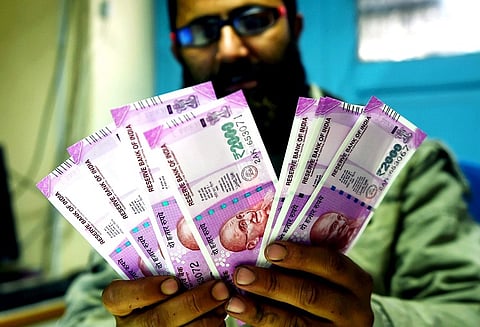

Thousands are queuing up outside banks and post offices across the country, exchanging their banned 500 and 1000 rupee notes for the newly introduced currency on Wednesday. But two days after Prime Minister Narendra Modi announced the demonetisation of high value notes as a move “to break the grip of corruption and black money,” questions are being raised on the rationale of introducing the Rs 2000 note besides pumping in new Rs 500 and Rs 1000 notes.
TNM spoke to a few experts on whether they believed the introduction of the new higher denomination notes would weed out black money and corruption, as claimed by the government, or if it would be a self-defeating exercise.
Professor S Galab, Director of the Centre for Economic and Social Studies (CESS): I support the demonetization by the Central government as it is a good move. This will flush out all the black money in the country. Introducing Rs 2,000 notes will not be counterproductive either, as they will be easier to track and tougher to fake. The RBI will be able to track the new notes as they are starting afresh and keep an account of the notes better.
G Vijayaraghavan, Former Kerala State Planning Board Member: Well, no one is saying that India will be free -once and for all- from black money, as it can always come back into circulation after some time. This move by the Centre cannot eradicate black money from the country per se, but the suddenness of the move will definitely act as a deterrent to black marketeers in the future. It will go a long way in limiting the circulation of black money.
Also, this move has, in one stroke, forced black money out of circulation, at least for now. It has had the effect of conducting one or two lakh IT raids simultaneously across the length and breadth of the country.
R Vaidyanathan, IIM-Bangalore professor: The new notes cannot be easily faked. My sense is that the new Rs 2000 note has Radio frequency identification (RFID) tags but the government is not coming forward to announce it. The new notes have some tracking mechanism in them.
The demonetisation in 1978 was totally different. It was chaotic back then. The technology now is much better than it was in 1978.
The next step in the fight against black money is to criminalise how much cash one can hold. At the moment, keeping any amount of cash is not a crime. Now, even if you keep Rs 50 lakh at home, no one can do anything unless there is an IT raid.
Venkatesh Athreya, former head of Department of Economics at Bharathidasan University: The demonetisation exercise is based on the wrong premise that there is a large amount of black money that is held as cash. Most black money is in the form of bullion or real estate assets, or has already been sent abroad via hawala routes. Much black money is generated through under-invoicing of exports, with the difference being deposited in safe havens abroad. Black money is rarely idle cash, and is both generated and augmented through transactions.
The withdrawal of 500 and 1000 rupee notes is claimed by the government to be intended to address both black money and fake money. It is clearly not a strong measure for the purpose of addressing black money. If the purpose is to weed out counterfeit money, this could have been achieved in the normal course by gradually withdrawing the notes now in circulation and replacing them with new ones. That would have been far less disruptive for ordinary people who still function mostly in the cash economy and not that of plastic money.
Since black money is not just some stock of money, but is rather a "flow" that is generated in and augmented through commercial transactions, it will continue to be generated.
Himanshu, Associate Professor, Centre for Economic Studies and Planning, JNU: Demonetisation will weed out some black money. There will be people who are not in a position to convert it to white.
Demonetisation is a one-time exercise. At some point of time, black money will emerge because of loopholes. It is continuously generated.
With regard to the introduction of the Rs 2000 note, as inflation goes up, the value of the Rs 1000 note has gone down. You need to have a higher denomination for daily expenditure. How many Rs 100 notes will people be able to keep? A higher denomination note also gives people a sense of security.
(With inputs from Chintha Anil and Nitin B)